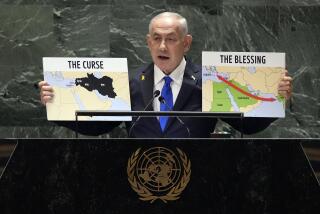U.N. Members Express a Fear of All-Out War
UNITED NATIONS — The Security Council held an emergency meeting on the escalating Middle East crisis Friday, with diplomats voicing fears that Israel’s assault on Yasser Arafat’s headquarters could lead to all-out war.
If Israel harmed Arafat, it would be “the mother of all mistakes,” a Palestinian official angrily declared.
Israel’s U.N. ambassador vigorously defended the military strike as a justified response to terrorism. But almost all of the 28 other diplomats who addressed the council Friday criticized the Israeli move for being “dangerous and unwise,” as Ireland’s U.N. ambassador said in a comment typical of the hastily convened Good Friday debate.
U.S. officials blocked Arab efforts to have the Security Council condemn the Israeli incursion, citing Secretary of State Colin L. Powell’s comments earlier in the day putting the blame for the clash on Palestinian suicide bombers.
“Terrorists have set back the vision of a Palestinian state that would live in peace side by side with the state of Israel,” said James B. Cunningham, the deputy U.S. delegate to the U.N., echoing Powell.
Cunningham, like Powell, condemned what he called Arafat’s failure to “bring the perpetrators to justice” and praised Israeli Prime Minister Ariel Sharon for what he called his “flexibility” in cooperating with U.S. cease-fire negotiations.
But the U.S. representative tempered Powell’s pro-Israel message by deploring “the killing and wounding of innocent Palestinian civilians” in the West Bank city of Ramallah, the site of Arafat’s compound.
“We understand that Israel has a right to self-defense, but we call on Prime Minister Sharon and his government to carefully consider the consequences of their actions,” Cunningham said. “Chairman Arafat is the leader of the Palestinian people, and his leadership is now and will be central to any meaningful effort to restore calm. We have made it clear to the Israeli government that he should not be harmed.”
U.N. Secretary-General Kofi Annan, who spoke with Powell shortly after returning from the region Friday morning, called on Israel to “halt the assault on the Palestinian Authority.” The destruction of Arafat’s fledgling government “will not bring peace; it will bring the region even closer to war,” Annan said in a statement issued before the Security Council began its evening session.
Annan did, however, reiterate his strong condemnation of recent Palestinian suicide bombings.
“I understand, in fact I share, the anger of the Israeli government and people over these attacks,” he told the council Friday night. “The intention of such attacks, which I have consistently and unreservedly condemned as morally repugnant, is to subvert the possibility of any peaceful settlement. Terrorism will not bring the Palestinian people closer to their long-deserved claim of the right to self-determination.”
But Israel should stop using “disproportionate lethal force and other measures that violate international laws and standards in response to terrorist attacks,” Annan said.
Israel’s U.N. ambassador, Yehuda Lancry, dismissed criticism of his government’s military action, calling it an ethically and legally defensible response to the terror attacks that have killed scores of Israeli civilians in recent weeks.
“As for Chairman Arafat, we want to send him the message that there is no inviolable immunity for him as the mastermind of terrorism and violence,” Lancry said. Arafat “gave safe haven to dozens of Palestinian terrorists” in his Ramallah compound, he charged.
The United Nations had been closed for the Good Friday holiday, but Arab nations demanded that the council meet immediately to discuss U.N. intervention in the conflict. The formal request for the meeting came from two of the more moderate Arab states: Jordan, representing the Arab League, and Qatar, speaking for the larger Organization of the Islamic Conference.
The Arab diplomats said they had hoped an emergency session could force Israel to withdraw its forces from Arafat’s headquarters.
“This is another mad Sharonic step that will ensure that the region will be faced with more and more difficulties and more and more bloodshed,” said Nasser Kidwa, the Palestinians’ chief U.N. representative.
Kidwa, who said he had spoken to Arafat by phone earlier in the day, echoed fears in the region that the Israeli siege could lead to the Palestinian leader’s death, either deliberately or inadvertently.
“We need our elected president to live,” he said. “If the Israelis choose to take the ultimate crazy step, I think this will be the mother of all mistakes.”
But in closed-door consultations before the council’s public debate, the U.S. delegation distributed copies of Powell’s statement, which emphasized Israel’s right to defend itself. The Powell message was a clear signal, diplomats here said, that the United States would veto any resolution critical of Israel.
Arab diplomats decided to avoid a confrontation with Washington in part, they said, because they did not want to undermine the impact of an American-backed Security Council resolution just two weeks ago that for the first time endorsed the creation of an independent Palestinian state alongside Israel.
For Arabs and others here, the submission and passage of Resolution 1397 marked an unexpected and welcome reversal of the Bush administration’s contention that the Security Council should avoid substantive involvement in the conflict.
More to Read
Sign up for Essential California
The most important California stories and recommendations in your inbox every morning.
You may occasionally receive promotional content from the Los Angeles Times.










